Developing story
How we're responding to the war in Gaza
What to know about the humanitarian catastrophe in Gaza and MSF’s medical and humanitarian response.
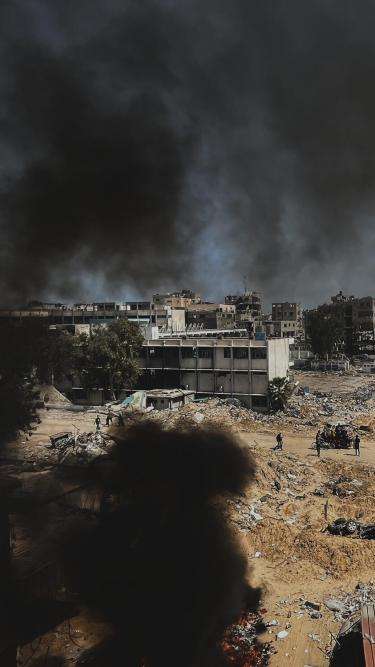
Developing story
What to know about the humanitarian catastrophe in Gaza and MSF’s medical and humanitarian response.
More than 10 months into the devastating war in Gaza, Israeli forces’ unrelenting, indiscriminate strikes have reduced much of the Strip to rubble and upended the lives of millions of Palestinians.
Nearly 40,000 Palestinians have been killed, over 91,000 wounded, and thousands are estimated to be buried under the wreckage. Over 1.9 million people—85 percent of the entire population—have been forcibly displaced. Water and food are scarce, essential supplies like fuel and electricity are scant, and while the threat of disease and starvation grows and the bombardment continues, lifesaving health care is increasingly inaccessible. Doctors Without Borders/Médecins Sans Frontières (MSF) teams in Gaza are witnessing firsthand how this war has turned Gaza's chronic humanitarian crisis into a catastrophe.
Photo above: Palestine 2024 © MSF
The ceasefire resolution passed by the UN Security Council on March 25 was not implemented, which renders it little more than political theater. Israeli forces continue to carry out widespread attacks that disproportionately impact civilians.
States must heed their obligations and do everything they can to stop the continued killing. Without an immediate and sustained ceasefire and the flow of meaningful humanitarian assistance, we will continue to see more Palestinians die.
The duty of treating the sick and wounded—and the correlating protection of medical personnel and facilities—is at the core of international humanitarian law. Yet, since the beginning of this war, MSF has seen a pattern of systematic attacks against medical facilities and civilian infrastructure. Our staff and patients have had to leave 13 different health structures and have endured 26 violent incidents, including airstrikes damaging hospitals, tank fire at agreed deconflicted shelters, ground offensives on medical centers, and firing at convoys. These attacks show the failure of deconfliction measures in a war fought with no rules.
Among the health care workers killed since October 7 are five MSF staff members: Mohammed Al Ahel, Alaa Al Shawa, Mahmoud Abu Nujaila, Ahmad Al Sahar, and Reem Abu Lebdeh.
The closure of the Rafah crossing in May due to the ongoing Israeli offensive is making it nearly impossible to deliver humanitarian assistance and provide medical care. As a result, stocks of fuel, food, water, and medicines are dangerously low and people are trapped by renewed fighting.
The US military anchored a temporary floating pier on Gaza's shoreline on May 16 to increase the flow of aid into the Strip. This is a glaring distraction from the real problem: Israel’s indiscriminate and disproportionate military campaign, a punishing siege, and the ongoing offensive on Rafah. Israel needs to facilitate rather than block the flow of supplies.
Opening the Rafah crossing would be the most effective and desperately needed solution given its proximity to people in need of assistance and by facilitating a larger flow of aid compared to other routes.
On January 26, the International Court of Justice (ICJ) issued provisional measures for Israel to take to prevent a plausible genocide in Gaza, including allowing humanitarian aid into the Strip. Yet we are witnessing a worsening situation in Gaza as indiscriminate attacks on civilians, medical and aid workers, and health facilities continue. On May 24, the ICJ ordered Israel to halt its offensive in Rafah and reopen the Rafah crossing.
All states that support these actions by Israel are morally and politically complicit. We call all on governments, particularly the US, UK, and allied EU member states, to use their power to influence Israel and stop supporting the ongoing siege and bloodshed.
There are over 88,000 wounded Palestinians in Gaza and very few hospitals left to provide them with the care they need. Among the wounded are thousands of patients requiring complex and sustained medical care that is not available in Gaza.
An estimated 14,000 patients in Gaza require medical evacuation, and this number is expected to increase due to the diminishing capacity of the health system compounded by the ongoing escalation in fighting. The closure of the Rafah crossing with Egypt has completely halted medical evacuation of patients since May 7. Since then, 600 patients have been held up despite being scheduled for evacuation.
Israel must resume issuing medical referral permits for treatment in the West Bank and Jerusalem for severe cases that cannot be treated in Gaza. All medical referrals, patients, and their caregivers must be guaranteed safe, voluntary, and dignified return to Gaza
MSF staff in Gaza, including local Palestinian staff and international teams
consultations per week at Al-Mawasi Health Post in Rafah
liters of water provided per day in Al-Mawasi and Khan Younis
MSF staff have been working in Gaza’s hospitals and clinics throughout the war. Our teams provide a range of essential medical services including:
Many of the hospitals MSF supports throughout Gaza have been hit or subjected to evacuation orders that put the lives of patients and staff at risk—so our teams are continually adapting to extremely volatile conditions on the ground. Today, MSF mainly operates in southern and central Gaza, including in Rafah, Khan Younis, and Deir al-Balah.
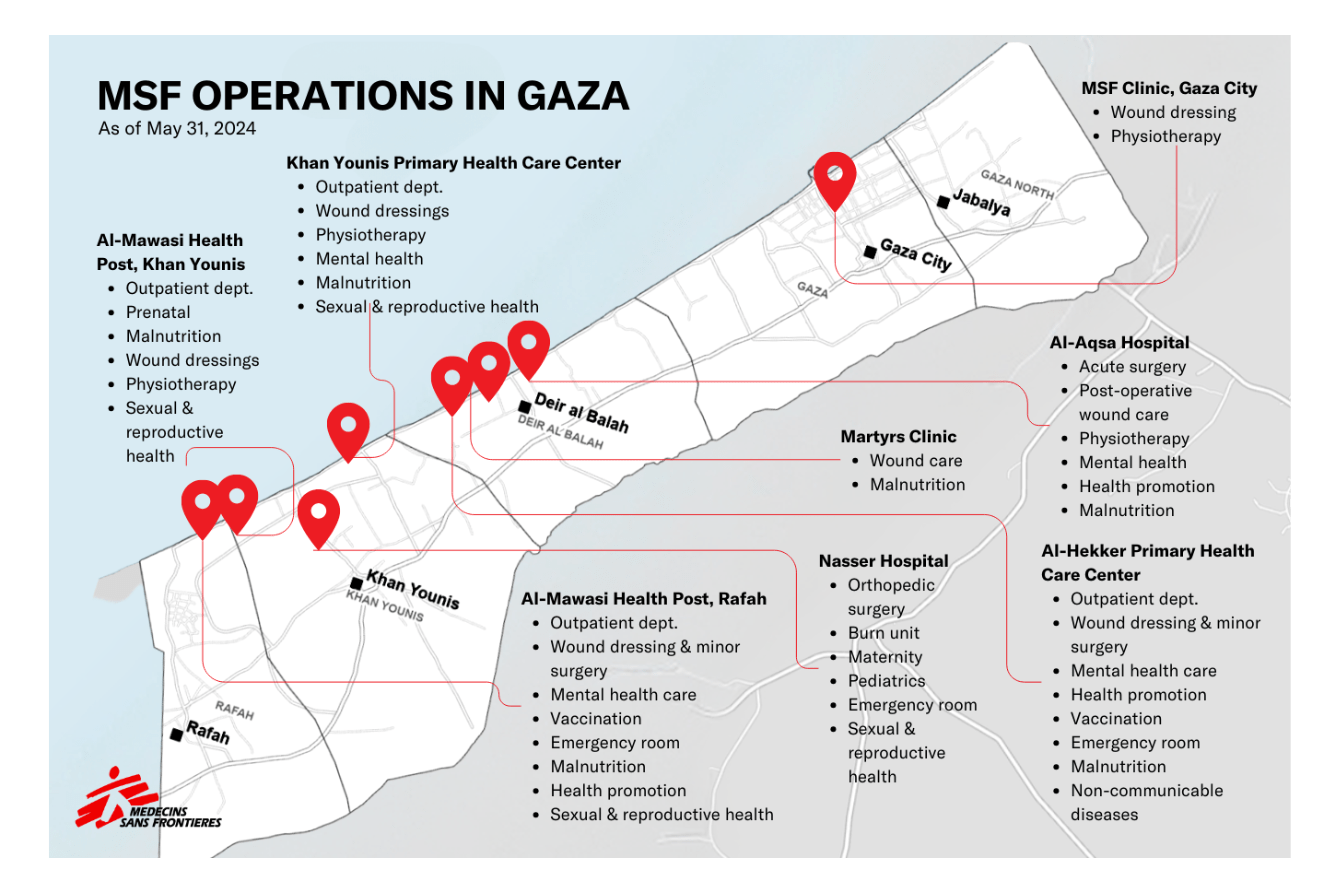
As of the end of May, MSF has brought in a total of 76 trucks of supplies into Gaza through the Rafah crossing point. However, bringing supplies into Gaza has been extremely difficult due to administrative barriers, movement restrictions, and lack of crossing options. Since the Rafah crossing closed in early May, there has been a significant decrease in the entry of trucks, from 24 trucks in March to only two trucks in May.
Drinkable water is scarce in Gaza, so water distribution is an important part of MSF’s response. We provide about 400,000 liters of water per day at 30 water distribution points in Al-Mawasi and Khan Younis. In Rafah, we provide about 300 cubic meters of clean water each day and are trying to increase this quantity. On March 28, MSF set up a new desalination plant in Al-Mawasi.
MSF has partnered with Palestinian NGOs since February 2024. Through our partnership with the Agriculture Development Association (PARC), we are implementing water and sanitation activities in camp shelters in Deir al-Balah and Khan Younis. This includes building latrines for more than 30,000 people across six camps, distributing hygiene kits for 2,400 families, providing clean drinking water to a population of 25,000 people per day. We also equipped a camp hosting people with disabilities with accessible latrines and showers.
The medical needs in Gaza are immense. Many Palestinians require urgent assistance—including people trapped under rubble, pregnant women who are about to deliver, and the elderly—and are not able to access the care they need. The core needs MSF is seeing and seeking to address include:
Since October 7, increasing settler violence against Palestinians and movement restrictions have exacerbated the health impacts of life under occupation, particularly on mental health and access to care.
MSF has responded by expanding efforts to reach communities where people are unable to access care, bolstering local emergency response, and addressing the needs of Gazans who have been stranded in the West Bank after losing their work permits in Israel after October 7. Our activities include:
MSF has a base in Egypt to facilitate the transit of our supplies and international staff. Our teams in Egypt are ready to send more medical supplies into Gaza if allowed to safely do so. We are in contact with the Egyptian authorities and the relevant organizations to start activities in Egypt and provide health care for injured or sick Palestinian people allowed to exit Gaza, if needed.
MSF does not currently run medical programs in Israel but offered its support to Israeli hospitals treating large numbers of casualties following the Hamas attacks on October 7. We focus on filling the greatest gaps in health care, and Israel has strong emergency and health systems.
MSF provides medical care to anyone who needs it, regardless of race, religion, or political affiliation. As an organization, we focus on filling the greatest gaps in health care.
To facilitate our humanitarian and medical work, we speak to all parties to the conflict to request safe, rapid, and unimpeded access to civilians who require medical care and to ensure the safety and security of our staff. Our independence and impartiality are essential to our work in all the places we operate across the globe. We also believe that the principles of impartiality and neutrality are not synonymous with silence. When the world turns its back on crises, we are duty-bound to raise our voices and speak out on behalf of our patients. Our decision to do so is always guided by our mission to do no harm, preserve respect and dignity, and protect life and health.
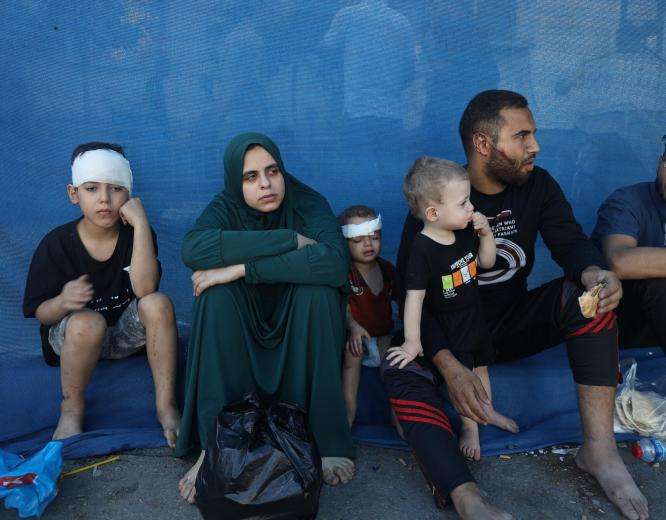
Members of MSF's team in Gaza share their experiences living and working under bombardment and siege.
August 12 02:21 PM
Drawings by Palestinian children reveal a chasm of suffering in Gaza.
Read More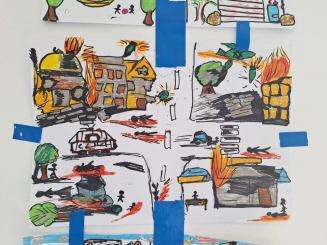
July 29 05:12 PM
MSF calls on all parties to ensure safe access to care and avoid the evacuation of Nasser Hospital, which would endanger hundreds of patients.
Read More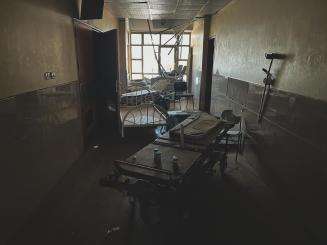
July 24 12:14 PM
As Netanyahu addresses US Congress, the situation for people in Gaza has never been so dire.
Read More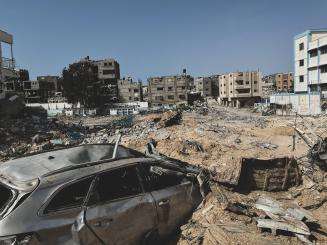
July 19 12:51 PM
An MSF staff member working in Gaza’s Nasser Hospital describes what teams are facing as horrific attacks continue and medical staff are stretched to the limits.
Read More091f.png)
July 18 01:39 PM
The health needs of Palestinian women and children are skyrocketing as the last hospital providing maternity care in Khan Younis faces shortages of vital supplies.
Read More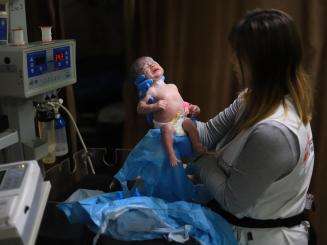
July 15 10:57 AM
“Every space was occupied by the injured or bodies of the dead”
Read More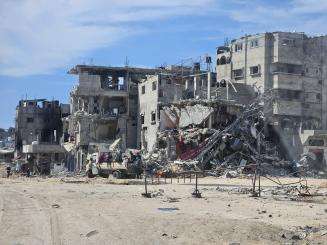
July 09 04:08 PM
Approximately 90 percent of Gazans have been displaced at least once since October 2023.
Read More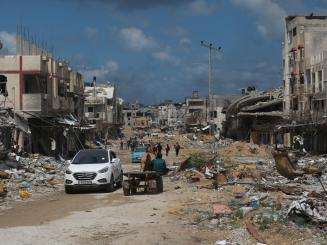
d375.png)
Some humanitarian crises make the headlines—others don’t. Unrestricted support from our donors allows us to mobilize quickly and efficiently to provide lifesaving medical care to the people who need it most, whether those needs are in the spotlight or not. And your donation is 100 percent tax-deductible.